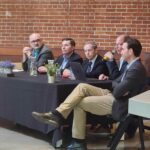Meet the Writing Fellows Alum Who’s Turning Cynics into Optimists
Since its launch in the fall of 2014, AF’s Writing Fellows Program has helped more than 150 young professionals develop their writing skills and learn how to get published. Below, Chelsea Follett, managing editor of the Cato Institute’s HumanProgress.org and fellow in our summer 2017 class, discusses her work and explains how the program has helped her career. To learn more about how the Writing Fellows Program can boost your own career in writing, see here.
 What piece are you most proud of writing, and why?
What piece are you most proud of writing, and why?
I’m very excited about a policy analysis piece that documents how, and by how much, markets have transformed women’s lives for the better. The paper counters the narrative that markets harm women, which is unfortunately the dominant narrative in many circles. Over the last 200 years, economic progress has helped to bring about both dramatically better standards of living and the extension of individual dignity to women in the developed world. Today the same story of market-driven empowerment is repeating itself in developing countries. Labor market participation offers women economic independence and heightened societal bargaining power, while market-led innovation has improved the lives of women even more so than for men.
Applications for the Summer 2019 term of the Writing Fellows Program are now open! Apply here before April 26!
What topic do you wish more people were writing about?
I’d like to see more data-backed pieces that focus on long-terms trends such as the unprecedented decline in world poverty, rather than writing that foregrounds the fleeting political micro-dramas of the moment. Every day for the last twenty-five years, the number of people in extreme poverty has fallen by 137,000, yet that fact rarely receives media coverage and most people are unaware of it. As captivating as it may be when a politician orders a bagel in an unusual way, there are more important stories that need telling. I greatly appreciate that the AF Writing Fellowship program focuses on cultivating substantive policy writing.
In what way has AF been helpful in advancing your career?
The AF Writing Fellowship gave me the opportunity to connect with some incredible writers, and provided me with writing advice that I now keep in mind every time I put pen to paper (or rather, fingers to keyboard). An op-ed of mine that we workshopped as a group during the fellowship was eventually published in Forbes. Not long after that I was humbled to be named to Forbes’ “30 Under 30” list in the category of Law & Policy, which has been a huge honor and helped to raise the profile of my work. The op-ed may have had some influence on the judges’ decision — so I owe a lot to the excellent guidance I received from Jason and from my fellow Writing Fellows.
What drew you to a project like Human Progress?
In graduate school, I read Steven Pinker’s The Better Angels of Our Nature for class, and Matt Ridley’s The Rational Optimist for pleasure. Those two books had a big impact on my worldview. So I was thrilled to be accepted to Cato’s internship program and placed with HumanProgress.org, which has both Dr. Pinker and Mr. Ridley on its advisory board. I was very fortunate that HumanProgress.org was looking for a new managing editor at the time and that I was given the opportunity to take on that role at the internship’s conclusion. For the past four years I have gotten to live out a dream job: getting paid to read and write about policy topics I’m passionate about, edit other scholars’ work, interact with data, and spread rational optimism.




